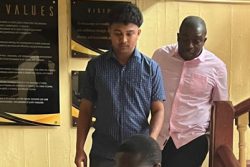Never has ‘history’ loomed so large in a Guyanese election campaign. While it is true that it has always been a favourite topic for politicians whenever a national poll is in the offing, this time, it almost forms the centrepiece of the Freedom House drive for re-election. Even the events of 1953 have been dragged into the spin-doctored accounts, although more than sixty years have elapsed in the interim.
The reason why most of it is coming from the PPP side is not difficult to find. That party has been in office for almost 23 years, and is in the position of having to defend a record which is fresh in everyone’s memory, and of making pledges to the electorate, many of which have been made before in previous elections. When they seek to compare their record with that of the opposition, therefore, they have to refer to a period beyond the frontier of many voters’ direct recall, and to a time when the world was a different place.
There is a lot of talk about not forgetting our history, but what is being peddled is not really history in the recognised sense of that term, but selected items from the past, much of it, although not all of it, inaccurate, and most of it devoid of any context. But then politics in this country was never primarily about the truth.
If one were to listen to the accounts of events between 1964 and 1992 advanced by representatives of the two sides what one would hear would be two quite different, and often, incompatible ‘histories.’ It is at the very least, a symptom of the extent of the divide. The two main versions, of course, correspond to the two major ethnic groups, since they are the ones which have had their hands on the levers of power for the past half century.
What it means is that all talk of ‘unity’ on the side of the ruling party, is belied by the constant repetition of interpretations of ‘history’ in which many of the early politicians associated with the other ethnic group play a malevolent role. By extension, therefore, it is the other ethnic group itself which becomes linked with the earlier period and everything that it is claimed went wrong during it. ‘History’ consequently, becomes a proxy for another kind of debate.
And the PPP has an unrelenting approach to its accounts of the happenings from the 1950s onwards; its story very much takes the form of a received wisdom, from which it tolerates no deviation. Anyone with a different account is written off as ‘revisionist,’ and there is certainly no disposition to discuss the historical issues outside the framework of political partisanship, adducing evidence in support of a position. This ‘history’ has become deeply engrained in the psyche of the ruling party, with itself in the role of victim.
Even within the severe limitations it has imposed on itself in terms of how it wants to portray the past, the party is not at all fussy about the accuracy of the details it seizes upon for propaganda purposes. Its references are all to Burnham’s Guyana, for instance, completely ignoring Hoyte’s seven years in office, and simply extending its generalizations down to 1992. As a consequence, the PPP/C government is given credit for what happened under Hoyte, such as lifting the restrictions on the importation of food items and the opening up of the press, to give but two simple examples.
It is not as if, as said above, that the PNC does not have its own account of its years in power, which concentrates on the positives and has its own story of the other side’s malevolent role. It is, of course, more on the defensive than it need be, because it has never acknowledged its association with rigging between 1968 and 1985. It would have saved itself a lot of heartache if it had done so earlier, more especially since Hoyte was the one who in the end committed the country to a free and fair election in 1992. As it is, however, the coalition has no need to go back to a pre-1992 era – although some of its supporters find it necessary to answer the PPP’s received ‘history’ – since as mentioned above, it has the recent past to focus on. In addition, any commitments it makes about what it would do in government, do not have the disadvantage of having been heard before.
Politicians use snippets of history for their own political purposes; their objectives are simply not the same as those of historians. Guyana’s political history since the Second World War is not a straightforward story, and a meaningful understanding of what transpired requires a far more measured, thorough, objective and professional approach than anyone in Freedom House or Congress Place has ever brought to bear on the matter. This does not mean to say that historians themselves will not disagree about the past; but the nature of their debate will be of an entirely different character to what most of our politicians can aspire to.
At some level, however, one would hope that in the end, some kind of unified history in a larger sense – which will nevertheless still accommodate disputes – will be possible in the future, and we can escape from the politicians’ oft repeated pseudo-historical scraps with their endless imputations of blame that come to pass for the truth. Certainly there are historians who are working and have worked on the period in recent times, bringing new insights to our understanding of events, but not surprisingly, little notice has been taken of this work, particularly by the PPP. As it is, therefore, party versions of ‘history’ continue their role in serving to perpetuate the traditional divide.








